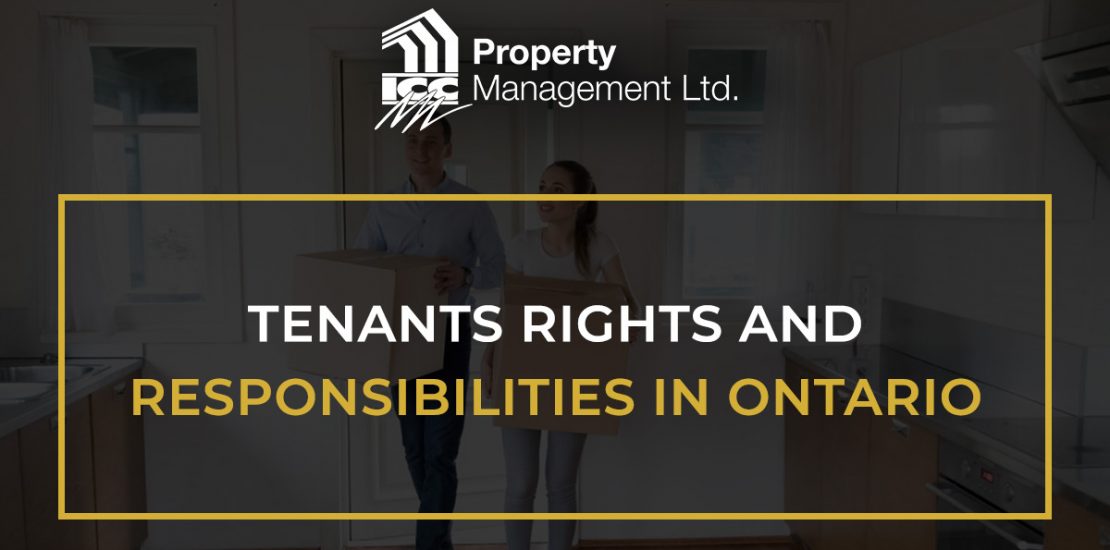Tenants Rights and Responsibilities in Ontario
- February 13, 2019
- Posted by: @dmin
- Category: Uncategorized

It might feel at times that there are ‘grey zones’ in what tenants in Ontario can and cannot do, but in reality, the law is clear in terms of tenant rights and responsibilities.
Where to Learn About Tenant Rights in Ontario
In Ontario, tenant rights are defined in two legal documents: the Ontario Human Rights Code (the Code) and the Ontario Residential Tenancies Act (RTA).
Ontario Human Rights Code
The Code states that tenants cannot be discriminated on the basis of:
- race
- ethnic background
- place of origin
- religion
- gender
- sexual orientation
- marital status
- family status
In other words, no one has the right to deny someone from renting based on any of the above attributes. Should this happen, then the landlord is in violation of the Code. The Code is general in its scope, so it applies not just to renting a home, but employment and other scenarios as well.
Ontario Residential Tenancies Act
When it comes to renting specifically, you must refer to the RTA.
The RTA is applicable to most private residential units, including detached and semi-detached houses, townhouses, apartments, condos, and secondary units such as basements. However, the RTA does not apply to university or college dorms, shelters, hospitals, or nursing homes.
Before Renting
The RTA works to protect tenants before they rent.
First, tenants have the right to readily understand the lease. The lease must be easy to understand and landlords or property managers who rent out are required to use a standard lease template.
Second, the lease itself must include information about the rent amount owed, when it’s due, what’s included in the rental offer (e.g., air conditioning, parking, etc), and rules and by-laws.
Third, the lease must also clearly stipulate who is responsible for maintenance and repairs, and when the landlord can enter the tenant’s unit.
If a tenant is owed a standard lease, then the landlord must provide it within 21 days. If the tenant does not get one, then they can withhold one month’s rent. If not provided within 30 days, then they can keep the rent for that one month (but must pay for subsequent months).
Avoid Costly Penalties by Meeting Tenant
Rights Under Ontario’s Laws
While Renting
The RTA provides tenants of rental housing with the following rights:
If the landlord wants to enter the tenant’s unit, they must provide 24 hours notice in advance and in writing. The notice must also provide a valid reason as well as time and date of the visit.
Valid reasons to enter can include making repairs or to inspect the unit when the lease is getting terminated (by either side).
Second, the landlord can only increase rent once per 12 months after the previous increase after the tenant moves in. Rent increases are capped to 1.8% of the current rental amount.
Tenant Rights in Toronto
In addition to the RTA, tenants also have rights under the Toronto Municipal Code.
These include:
Temperature: The landlord must provide heat to the rental unit to a temperature of at least 21° C in all areas of the unit from September 15 to June 01.
Transition to Month-to-Month: Once the lease is complete, the tenant does not have to renew it. The rental unit’s lease transitions to a month-to-month agreement automatically.
What are the Responsibilities of a Tenant?
While the RTA confers tenants with many rights, they also have responsibilities, such as:
Completing the Lease: If the tenant is renting under a lease, they are obliged to complete it. They can assign it to a different person, but with approval from the landlord. In case the tenant is renting on a month-to-month basis, they must provide 60 days notice to the landlord.
Must Pay Rent: Tenants cannot withhold rent (except in the one situation described earlier). Even a lack of maintenance or disrepair in the building is not a valid cause for withholding rent.
More on Building and Property Management:
- 6 Rules Registered Property Management Companies Must Follow to Remain Compliant with the Ontario Condo Act
- Property Management Best Practices: How to Know if You Have an Excellent Property Manager
- How Much do Condo Property Management Services Cost in Toronto?
Must Let the Landlord Enter: If the landlord has provided notice and a reason in alignment with the RTA, then the tenant must let them in the unit, even if they are not present. If the tenant changes the locks, they must provide a key to the landlord.
You May Need to Leave: If the tenant failed to pay rent, the landlord can submit an application to the Landlord and Tenant Board (LTB) to terminate their rental agreement and evict them. Likewise, the landlord can also apply to the LTB to terminate an agreement if they require the rental unit for personal use.
Conclusion
The purpose of the Code and the RTA is to ensure that the rights of both the tenant and landlord are protected. Tenants are entitled to a home that is fit for habitation, while landlords are entitled to protecting their property.
ICC Property Management will ensure that you are fulfilling their obligations to tenants under the Ontario Human Rights Code and the Residential Tenancies Act. From building maintenance to rent management and ensuring occupant safety and comfort, we’ll work to increase the value and attractiveness of your property. Speak to us today for a FREE proposal.
